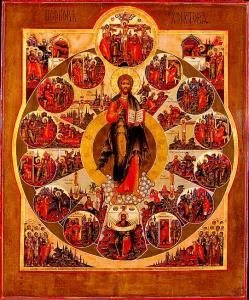
St. Maximos the Confessor’s complex theology engages many concerns, from the cosmic significance of Christ’s work, to the nature and modality of the will. His concern with the will, and how we will, is found throughout his writings. However, it became far more important and significant for him when he realized the Christological aspects involved with the question of the will. Christ, being fully God and fully man, has a human will, even as he has a divine will. How, exactly, could that be? Did Christ act out of deliberation and the ignorance which underlay such deliberation, that is, with a gnomic mode of willing, or did his actions transcend the need for deliberation? Maximos’s answer is that the gnomic mode of willing is a fallen mode of willing, and Jesus, not having a fallen human nature, did not engage his will through such a modality:
Thus, those who say that there is a gnomie in Christ, as this inquiry is demonstrating, are maintain that he is a mere man, deliberating in a manner like unto us, having ignorance, doubt, and opposition, since one only deliberates about something which is doubtful, not concerning what is free of doubt. By nature we have an appetite simply for what by nature is good, but we gain experience of the goal in a particular way, through inquiry and counsel. Because of this, then, the gnomic will is fitly ascribed to us, being a mode of employment [of the will], and not a principle of nature, otherwise nature [itself] would change innumerable times. But the humanity of Christ does not simply subsist [in a manner] similar to us, but divinely, for He Who appeared in the flesh for our sakes was God. It is thus not possible to say that Christ had a gnomic will. [1]
At first glance, it can seem that St. Maximos is arguing that Christ, in his humanity, is not like us, because he did not and will not engage the will like we do. Does that mean he is not perfectly human? No. Maximos knew it was important to say Christ had a human will, and that is what got him in trouble, for his opponents suggested otherwise. Christ truly has a human will; the issue is how he engages that will. Christ wills what he wills by nature, following the good, natural appetites and desires found in the human condition when it is not corrupted by sin. Thus, how he will, is a way which we could and all would will, if we willed, not according to the deliberative process established in the gnomic mode of willing, but according to the purity of our nature. The good which Christ willed is the good which all of us would will, if we acted according to nature and did not try to reason out what that good should be. Virtues are natural, and those who engage what our will would will naturally will participate and activate those virtues, but those who act through deliberation will struggle to engage those virtues; what we achieve and the amount of goodness associated with our actions, will differ according to how far off our deliberation is from the potential found within our nature.[2]
One of the goals of the Christian life is to transcend our fallen mode of willing, to transcend the gnomie, to learn how to rely upon and act upon the virtues already contained within us; that it, it is to uncover and activate the good which we possess according to our nature and to act according to that good. We are to move beyond mere rationalism, and the various questions and deliberations which arise from such questions, and learn how to act naturally and without the need for discursive reasoning to interfere with our will. Then, when we do so, we will find ourselves acting in union with God, just as Christ’s human will acted in union with his divine will. But to do so, we must begin to act in accordance to the good which we have already realized, for by doing so, they help us learn how to act according to the good apart from deliberation and rationalization and instead, to act in the pure instinct of the natural good. Thus, much of what Jesus spoke of should help us move in this direction. Our prayer should be united to such a goal, and so we find in the prayer Jesus gave to us to pray, the Our Father, what we can and should do to help move us towards acting out of the purity of our nature. He tells us to overcome those selfish inclinations we have which separate ourselves from each other and therefore from the common good of our nature. Thus, we forgive each other, so that in such forgiveness, we move closer to each other and the common good which is found in each other; as we move closer to that common good, we find ourselves acting upon and realizing the good which is in us by nature:
This surely is why God wishes us first to be reconciled with one another. He Himself has no need to learn from us how to be reconciled with sinners and to waive the penalty for a multitude of atrocious crimes; but He wishes to purify us of our passions and show us that the measure of grace conferred on those who are forgiven corresponds to their inward state. It is evident that when man’s will is in union with the principle of nature, he is not in a state of rebellion against God. Since the principle of nature is a law both natural and divine, and there is nothing in it contrary to the Logos, when a man’s will functions in accordance with this principle it accords with God in all things. Such a condition of the will is an inner state actively characterized by the grace of what is good by nature and hence productive of virtue. [3]
Thus, Maximos tells us, not only does Jesus act according to the pure goodness of his human nature, so that what he wills according to his human will is perfectly good, Jesus follows a modality of willing which we are called to follow. Through grace, we will be able to do so. This is why Maximos cannot be said to be denying Jesus’ humanity. Maximos understood that Jesus acts in a perfectly unfallen manner, a manner which we, through grace, can and will hopefully realize for ourselves. It is a mode of willing which transcends the question of knowledge and deliberation based upon knowledge – and so the question of what Jesus knows or does not know, according to his humanity, is irrelevant here We do not have to have such objective knowledge to act properly, indeed, we will not know everything before we act, but if we listen to the good within instead of deliberate and guess upon the good which we should do, we will be able to follow the good so that all we do is good.
[1] St. Maximus the Confessor, The Disputation with Pyrrhus. Trans. Joseph P. Farrell (South Canaan, PA: St. Tikhon’s Seminary Press, 1990), 31 – 2 [87].
[2] See St. Maximus the Confessor, The Disputation with Pyrrhus, 32-3 [88-95].
[3] St. Maximos the Confessor, “On the Lord’s Prayer” in The Philokalia: the Complete Text. Volume II. Trans. G.E.H. Palmer, Philip Sherrard and Kallistos Ware (London: Faber and Faber, 1981), 301.
Stay in touch! Like A Little Bit of Nothing on Facebook.
If you liked what you read, please consider sharing it with your friends and family!













